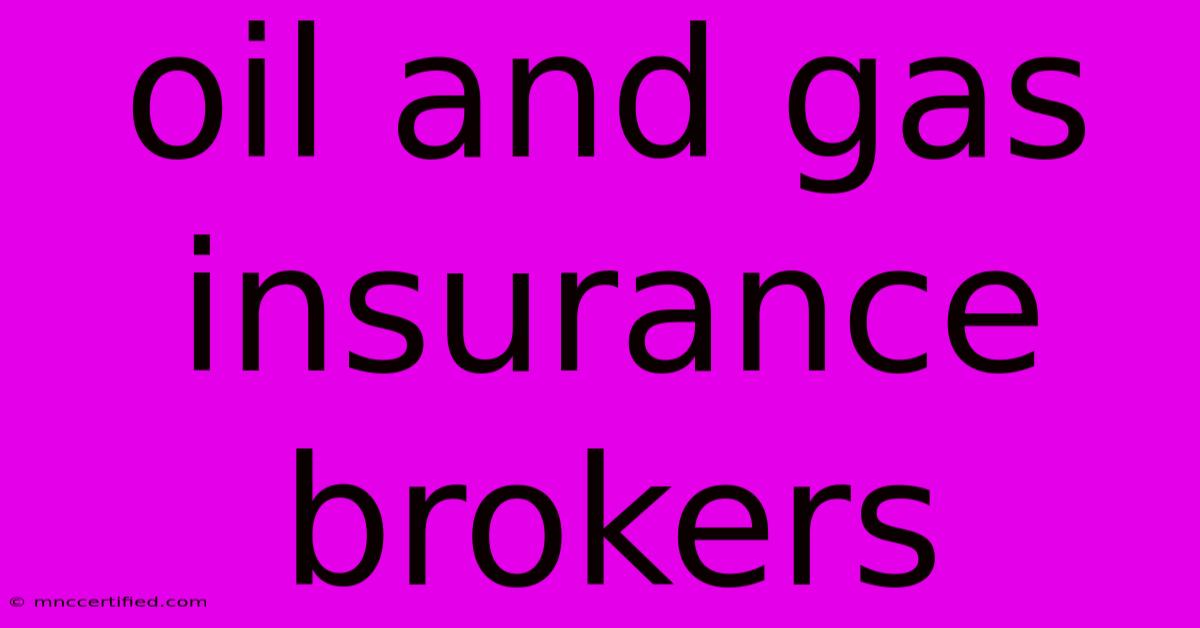Oil And Gas Insurance Brokers

Table of Contents
Navigating the Complex World of Oil and Gas Insurance: The Crucial Role of Brokers
The oil and gas industry is inherently risky. From volatile energy prices to the potential for catastrophic accidents, operators face a unique set of challenges. This is where oil and gas insurance brokers become indispensable. They act as navigators, guiding energy companies through the complex landscape of insurance policies to secure the optimal coverage for their specific needs. This article delves into the critical role these brokers play, exploring their expertise, the types of insurance they handle, and how to choose the right one for your business.
Understanding the Risks in Oil and Gas
Before diving into the role of brokers, it's essential to understand the multifaceted risks inherent in the oil and gas sector. These risks encompass:
- Operational Risks: These include accidents during exploration, drilling, production, transportation, and refining. Potential incidents range from equipment malfunctions to spills and explosions, resulting in significant financial losses, environmental damage, and legal liabilities.
- Financial Risks: Price volatility, project delays, and regulatory changes all contribute to financial uncertainty. Hedging strategies and robust insurance policies are crucial to mitigating these risks.
- Environmental Risks: Oil spills, gas leaks, and other environmental incidents can lead to hefty fines, cleanup costs, and reputational damage. Comprehensive environmental liability insurance is paramount.
- Political and Regulatory Risks: Changes in government regulations, political instability in operating regions, and sanctions can significantly impact operations and profitability.
The Expertise of Oil and Gas Insurance Brokers
Oil and gas insurance brokers possess specialized knowledge of the industry's unique risks and the insurance solutions designed to address them. They aren't just salespeople; they are risk management consultants who:
- Analyze Risks: They conduct thorough assessments of your company's operations, identifying potential hazards and vulnerabilities.
- Develop Customized Strategies: Based on the risk assessment, they design tailored insurance programs that offer the right level of coverage at the most competitive price.
- Negotiate with Insurers: They leverage their relationships with numerous insurers to secure favorable terms and conditions.
- Manage Claims: In the event of a claim, they guide you through the process, ensuring you receive the compensation you are entitled to.
- Stay Updated on Industry Trends: The oil and gas industry is constantly evolving. Brokers stay abreast of new regulations, technologies, and risk profiles, ensuring your insurance remains relevant and effective.
Types of Insurance Handled by Oil and Gas Brokers
Oil and gas insurance brokers typically handle a wide array of policies, including:
- Property Insurance: Covers physical assets such as drilling rigs, pipelines, refineries, and processing plants against damage or loss.
- Liability Insurance: Protects against claims of bodily injury, property damage, and pollution arising from operations. This often includes Environmental Liability Insurance (specifically covering environmental damage).
- Business Interruption Insurance: Compensates for lost income during operational downtime due to covered events.
- Workers' Compensation Insurance: Provides benefits to employees injured on the job.
- Marine Insurance: Covers risks associated with transporting oil and gas by sea.
- Construction Insurance: Protects projects during the construction phase.
Choosing the Right Oil and Gas Insurance Broker
Selecting the right broker is crucial for effective risk management. Consider these factors:
- Experience and Expertise: Look for brokers with a proven track record in the oil and gas industry.
- Market Access: A broker with strong relationships with multiple insurers can secure better terms and broader coverage.
- Client Service: Choose a broker known for responsive and proactive communication.
- Financial Stability: Ensure the brokerage firm is financially sound and reputable.
- References: Request references from existing clients to gauge their satisfaction.
Keywords: Oil and Gas Insurance Brokers, Oil and Gas Insurance, Energy Insurance, Insurance Brokers, Risk Management, Oil and Gas Industry, Environmental Liability Insurance, Property Insurance, Liability Insurance, Business Interruption Insurance, Workers Compensation Insurance, Marine Insurance, Construction Insurance
Conclusion: Partnering for Success
Navigating the intricate world of oil and gas insurance requires specialized expertise. Partnering with a reputable oil and gas insurance broker is not just advisable; it's essential for ensuring your business is adequately protected against the inherent risks of the industry. By carefully considering the factors outlined above, you can find a trusted partner to guide you towards a robust and cost-effective insurance strategy. This will ultimately contribute to the long-term success and sustainability of your operations.

Thank you for visiting our website wich cover about Oil And Gas Insurance Brokers. We hope the information provided has been useful to you. Feel free to contact us if you have any questions or need further assistance. See you next time and dont miss to bookmark.
Featured Posts
-
2024 Macys Parade Live Stream Guide
Nov 29, 2024
-
123 Thanksgiving Black Friday Deals 2024
Nov 29, 2024
-
Best Black Friday 2024 Deals Guide
Nov 29, 2024
-
Greenline Insurance Group Inc
Nov 29, 2024
-
Japanese Import Car Insurance
Nov 29, 2024